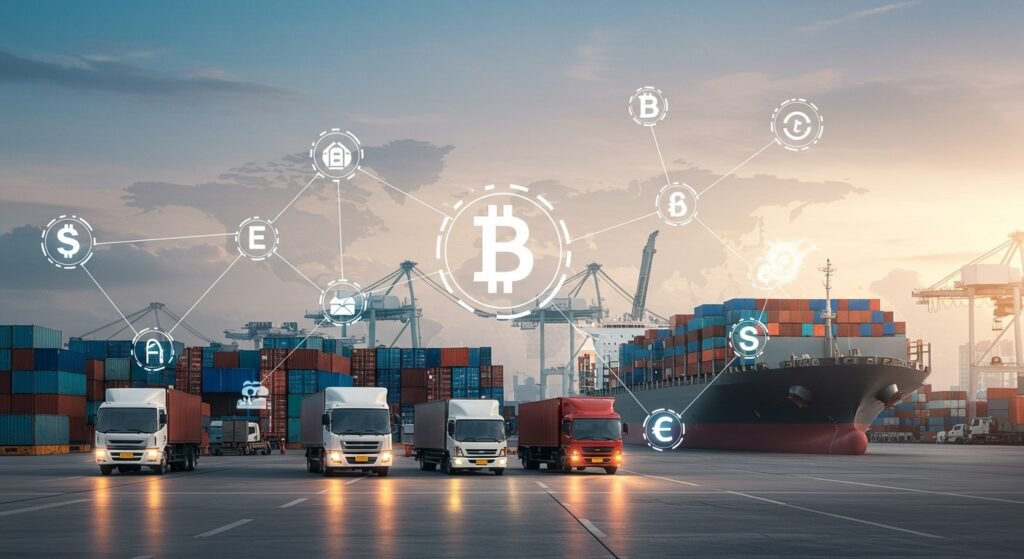Blockchain for Transparent and Secure Supply Chain Networks
In an increasingly interconnected world, supply chain networks have grown incredibly complex, often leading to challenges in transparency, traceability, and security. The advent of blockchain technology offers a transformative solution, promising to revolutionize how goods and information move across the globe. By creating an immutable, distributed ledger, blockchain supply chain applications can provide unprecedented levels of visibility and trust, addressing some of the most pressing issues faced by industries today. This article delves into the profound impact of blockchain on fostering transparent and secure supply chains, exploring its mechanisms, benefits, and the future it heralds for global commerce.
Table of Contents
- Introduction: Unlocking Visibility
- The Core Problem: Opacity and Insecurity in Traditional Supply Chains
- How Blockchain Revolutionizes the Supply Chain
- Key Benefits of Implementing Blockchain in Logistics
- Overcoming Challenges and the Future Outlook
- Conclusion: A New Era of Supply Chain Management
The Core Problem: Opacity and Insecurity in Traditional Supply Chains
Traditional supply chains are notorious for their lack of transparency. Information often resides in silos, making it difficult to track products from origin to consumer. This opacity can lead to several problems: counterfeiting, ethical sourcing concerns, inefficient dispute resolution, and a general lack of trust among stakeholders. Furthermore, the reliance on centralized systems makes them vulnerable to cyberattacks and data manipulation, posing significant security risks and potential financial losses for businesses worldwide.
How Blockchain Revolutionizes the Supply Chain
Blockchain’s decentralized and cryptographic nature provides an ideal framework to overcome these entrenched issues. Each transaction, or “block,” is securely linked to the previous one, forming an unchangeable chain of records. This distributed ledger is accessible to all authorized participants, ensuring a single source of truth.
Enhancing Transparency and Traceability with Blockchain Supply Chain
One of the most compelling advantages of the blockchain supply chain is its ability to offer end-to-end transparency. Every step of a product’s journey—from raw material sourcing, manufacturing, shipping, to retail—can be recorded on the blockchain. This allows all parties, including consumers, to verify the authenticity, origin, and condition of goods. For instance, in the food industry, consumers can scan a QR code to see where their produce was grown, when it was harvested, and how it was transported. This level of traceability is invaluable for quality control, recalls, and meeting regulatory compliance, significantly reducing the risks associated with product provenance.
Boosting Security and Reducing Fraud
The cryptographic security inherent in blockchain technology makes it highly resistant to tampering and fraud. Once a transaction is recorded, it cannot be altered or deleted. This immutability ensures the integrity of the data, safeguarding against counterfeit goods and unauthorized changes to shipping manifests or product specifications. Furthermore, by distributing data across multiple nodes, blockchain eliminates single points of failure, making the entire network more resilient to cyber threats than traditional centralized databases. This robust security framework protects sensitive information and enhances trust among all participants.
Streamlining Operations and Improving Efficiency
Beyond transparency and security, blockchain can significantly streamline various operational aspects of the supply chain. Smart contracts, self-executing agreements stored on the blockchain, automate processes like payments, customs clearances, and quality checks once predefined conditions are met. This automation reduces administrative overhead, minimizes human error, and accelerates transaction speeds. The result is a more efficient, cost-effective, and agile supply chain, capable of responding faster to market changes and disruptions. For more insights into how technology is transforming logistics, read our article on The Future of Logistics.
Key Benefits of Implementing Blockchain in Logistics
The adoption of blockchain technology brings a multitude of benefits across various sectors within logistics and supply chain management. These advantages translate into concrete improvements in operational performance and stakeholder satisfaction.
| Feature | Traditional Supply Chain | Blockchain-Powered Supply Chain |
|---|---|---|
| Transparency | Limited, often siloed | End-to-end, real-time visibility |
| Security | Vulnerable to single-point failures and fraud | Immutable, cryptographically secure records |
| Traceability | Manual, often incomplete | Automated, granular product history |
| Efficiency | Manual processes, delays | Automated via smart contracts, faster transactions |
| Trust | Requires intermediaries, often low | Decentralized, trustless environment |
These enhancements are particularly crucial for areas like risk management, where companies can quickly identify and mitigate issues like contamination or ethical breaches. Improved data quality also aids in better compliance with international regulations and fosters greater consumer confidence, especially in industries like pharmaceuticals and luxury goods where authenticity is paramount.
Overcoming Challenges and the Future Outlook
While the benefits are clear, the widespread adoption of blockchain in supply chains faces challenges, including integration with legacy systems, scalability concerns, and the need for industry-wide standardization. However, ongoing developments in blockchain technology, coupled with increasing industry collaboration, are paving the way for overcoming these hurdles. The future of the blockchain supply chain looks promising, with pilot programs demonstrating significant potential. As more companies realize the competitive advantage offered by enhanced transparency and security, blockchain is set to become an indispensable tool for global commerce. For further reading on global supply chain trends, you may want to consult resources like World Economic Forum’s Supply Chain insights.
Conclusion: A New Era of Supply Chain Management
Blockchain technology stands as a powerful disruptor, poised to redefine the landscape of global supply chain networks. By delivering unparalleled transparency, robust security, and improved operational efficiency, it addresses the core inefficiencies and vulnerabilities of traditional systems. The journey towards a fully integrated blockchain-powered supply chain will require sustained effort and innovation, but the foundational benefits—from reduced fraud and enhanced traceability to increased consumer trust—make it an imperative for businesses aiming for a competitive edge in the modern economy. The era of truly transparent and secure supply chains is not just a possibility; it’s rapidly becoming a reality, driven by the immutable power of blockchain.


